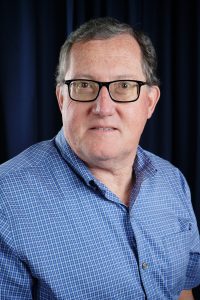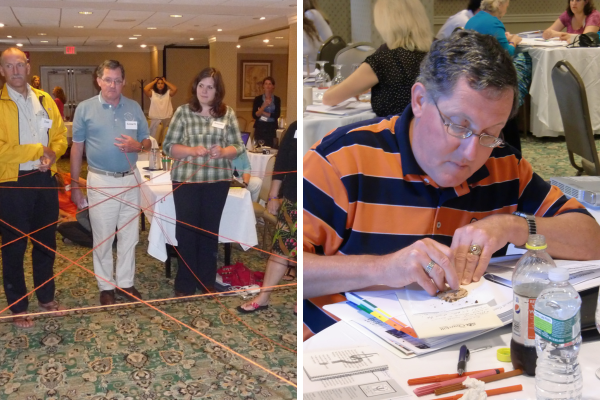
Population Education would like to congratulate Kenneth Jones as PopEd’s 2024 Most Valuable Trainer. Kenneth is a Lecturer and Master Teacher with UTeach Columbus at Columbus State University in Georgia. Kenneth’s experience working with preservice teachers has translated to his exceptional facilitation skills. His joy for teaching is evident in his constant willingness to lead workshops and the positive responses from participants.
How did you discover and begin using PopEd materials?
KJ: Before I was in this position with UTeach, I was Director of the Math Collaborative at Columbus State which does PD for teachers. Somebody from PopEd, I think Carol, was coming to Columbus and contacted me at the math lab. She asked about coming and doing something for teachers. So, we put together an afternoon workshop and Carol came to present. Some time after that, I got invited to come to DC and asked if I wanted to be a trainer. I came up, did the training, and y’all have been calling on me since.
I was a math teacher formerly and I usually go to GCTM. The GSTA conference has been here at Columbus State, NSTA has been in Atlanta, and some of the universities around here have reached out to want PopEd in their classes. I always try to say yes when asked.
What made you want to be a PopEd Trainer?
KJ: When Carol came [to present] I saw the value of the curriculum. I have always been an advocate of hands-on and inquiry-based instruction, and I saw that in the materials. The materials were easy for the teachers to use and adapt, and don’t require a lot of prep for them to put together.
I also like the idea of educating people about population and environmental issues. We have a responsibility to be stewards to the Earth. A lot of times people aren’t aware of the impacts of population growth and what to do about it, and they aren’t aware of the broader global perspective.
I also like the interdisciplinary perspective of the lessons. Like Mining for Chocolate could be science, social studies, ELA, or math, just depending on what you focus on in the lesson and the conversations you have after it.

Kenneth at the train-the-trainer Leadership Institute in 2011, participating in PopEd lessons Web of Life (left) and Mining for Chocolate (right).
What is your favorite (or favorites) PopEd lesson plan?
KJ: Mining for Chocolate I really like. Timber I like as well, using the popsicle sticks to demonstrate consumption and replacement of resources. It’s always fun to do Something For Everyone and the first time people usually end up taking the whole pile of chips in the middle and they don’t get the idea that you’re only going to double what is left. I like Panther Hunt where you have the cups all over the room – it’s a little more time-consuming but that’s a good life science one. I also enjoy Pop Riddles where you look at doubling time and see how quickly things go. That’s always an “aha” moment for people. For math workshops I like the one called How many Fish in the Sea (now How Many Flowers in the Field).
Which groups are your favorite to train?
KJ: I think my favorite is when I’ve gone to the preservice workshops (so the college students’ classrooms) because that is the population I work with. Sometimes they’re more open to some of the activities because they haven’t been in the classroom yet. Sometimes current teachers see the obstacles – “this is going to be messy” or “I have to get these supplies.” But the preservice teachers don’t see that first thing.
I also enjoy the larger groups. It can be difficult to do some of the activities with a really small group like 5 people. GAGC was one of the conferences with a really large audience – one of the largest I’ve had.
What is your most memorable experience or presentation as a PopEd trainer?
KJ: Probably the GSTA and the Georgia Gifted conference last year because they had fairly large audiences. Sometimes when you have a larger audience there are different things to figure out and I enjoy the challenge adapting it to fit the needs of the audience.
We did the lesson where you discuss scenarios and what they would do in those circumstances (Eco-Ethics) and, because we had a larger group, that generated lots of good discussion. So, I think those workshops where I’ve had larger groups and people really get excited about the activities and want to use them in their classroom are fun.
Any specific tips or ideas on using PopEd materials or presenting PopEd workshop?
KJ: Usually when I facilitate for PopEd, I try to adapt the lessons to my personality and style, so don’t do the lessons exactly as scripted; I make little modifications. They are small things like teaching strategies that I normally use. Something as simple as a turn and talk or a think, pair, share.
When you make it your own it seems like it’s coming from you rather than scripted and you are taking ownership. Anything you’re presenting that you really believe in and have a passion for, that really comes across to the audience. If you’re going to get involved in presenting you have to believe that students will benefit from this and see the real-world connection to topics.


